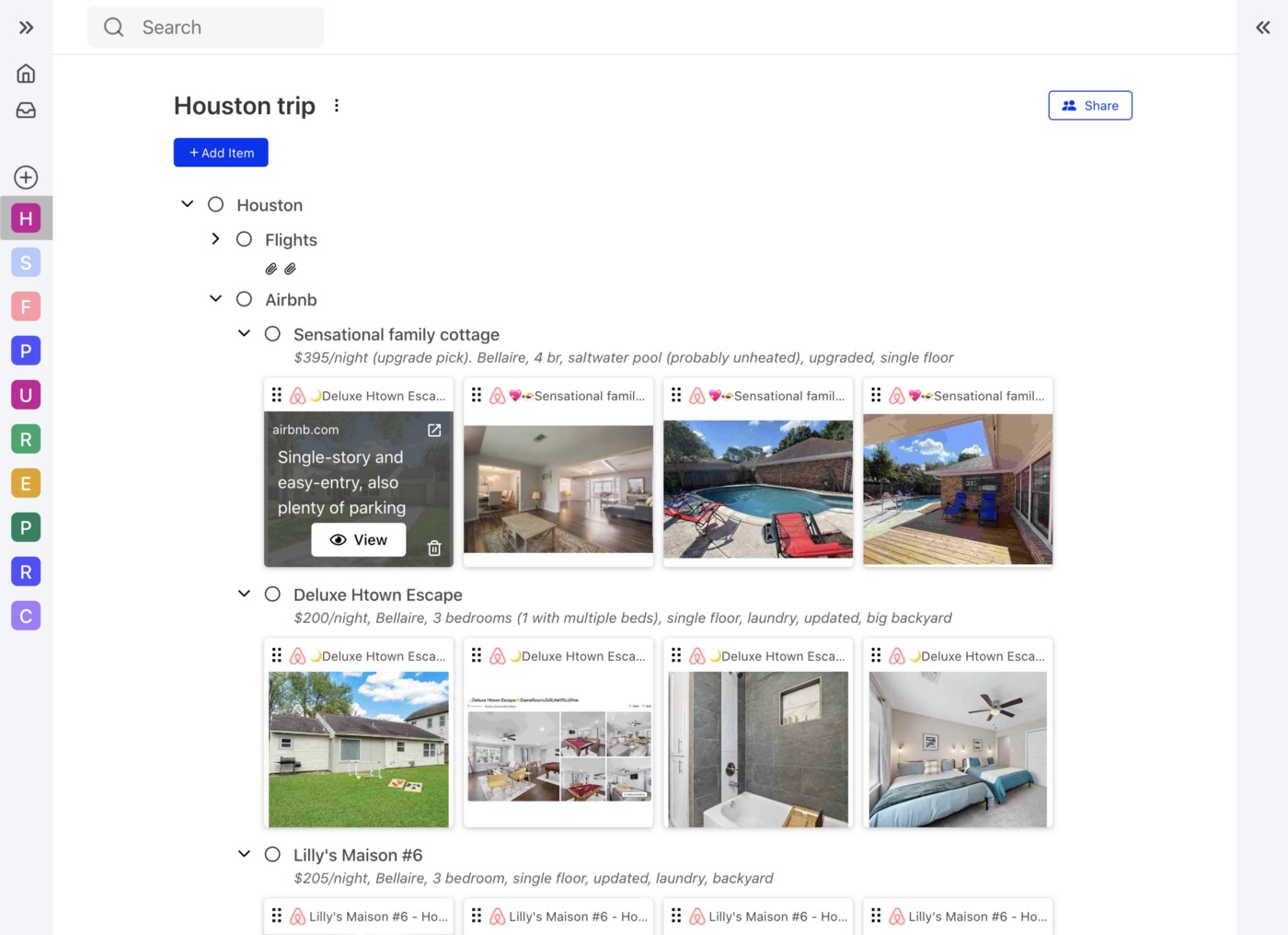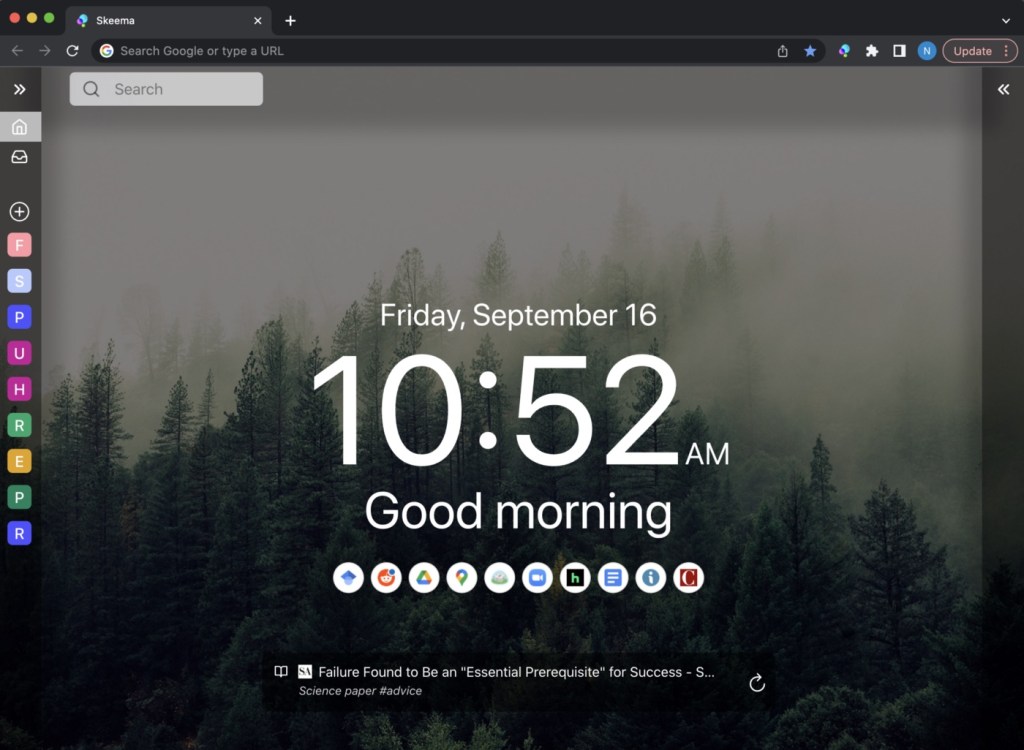This whole browser situation is utterly untenable.
I subscribe to a (really great) newsletter called “Today in Tabs,” the name of which sums up a problem that’s surely not unique to me: By 5 p.m. EDT, I have a line of tabs of stories I want to read culled from Twitter, various Slack channels, email newsletters and homepages.
That’s to say nothing about my job. If you’re a “knowledge worker,” you invariably end your day with a slew of tabs that collectively become your to-do list, your reading list, your shopping list, your assorted communications channels. It’s chaos, and it seems most of us are just … dealing with it?
There are, of course, tab-wrangling solutions in the market: Workona, Opera and Heyday, a vertical tabs feature recently introduced for Safari, etc.
I never considered any of them, and I’m a terminally organized control freak obsessed with productivity. In other areas of my life, I look for ways to maximize the efficiency of how my space is arranged. But not my tabs.
This speaks to the hegemony of Chrome: I accepted that the collection of features bestowed upon us by Google was what I needed to do my job, shop online and keep track of my life. It never occurred to me that a bare minimum of four windows with — depending on the time of day — two to two dozen tabs apiece was excruciating.
I know now that it is. In the interest of being a little servicey, let me tell you about Skeema, a fresh startup out of Carnegie Mellon University that could easily be tossed in the “tabs management” bucket, but actually does — and has the potential to do — so much more.
I didn’t think about the fact that this obvious problem was even a problem until a few weeks ago. A friend who works at CMU here in Pittsburgh dropped a link in our (Google, duh) chat to a Medium post written by Niki Kittur, a professor at CMU’s Human-Computer Interaction Institute and the CEO/founder of Skeema, a Chrome extension that immediately changed how I spend my day on the internet.
After using Skeema for just a few days and successfully corralling my tabs, I set up a chat with Kittur to learn how it came to exist.
Kittur said his work revolves around understanding how to combine human thinking and machines to fast-forward knowledge gathering and creativity, which led him to first identify the problem.
“We noticed that browser tabs just didn’t seem to be working anymore,” he told TechCrunch. “As researchers, we really wanted to understand what’s actually causing this.”
He noted that none of the various options for tab management fully solved the problem, and many were abandoned after a week or two.
So, Kittur and his students did what researchers do: They interviewed knowledge workers struggling to overcome their tabs.
Their research landed on four core problems, which Kittur detailed in the Medium post:
Reminding & Resumption. You’re constantly switching between unfinished tasks all day, leaving tabs open so you don’t lose where you left off.
Refinding. You leave docs and links open to avoid digging through emails or Slack or drives to find them again.
Resurfacing. You leave articles and papers open to read later because putting them away feels like giving up on your future self and opportunities for a better life.
Research. You are doing complex research tasks like trip planning or programming, where you are learning about different options and criteria to evaluate.
Well, yeah! Those are all for sure problems for me! Respectively:
- I have a daily lineup of tabs of TechCrunch stories to edit, in Google Docs or WordPress. I back that up with a handwritten paper note (madness!) detailing all those stories, just in case the tabs get away from me.
- Once a week, I edit a doc of TechCrunch+ tweets scheduled to be sent over the weekend. That’s a tab that’s always open! I also have a doc called “TechCrunch bits of code,” which is just that — scraps of HTML that I need for particular use cases several times a week.
- Another window contains unsearchable and increasingly dense tabs just for recipes I possibly want to make someday. (This is in addition to the nearly 100 recipe tabs open in Chrome on my phone.)
- My partner and I just bought a house. Moving the contents of a house and an apartment into another house is a “complex research task.” Insurance quotes, movers, chimney sweeps, contractors, Murphy bed options. Tabs abound!
After reading the Medium post, I was sold. I bolted Skeema onto Chrome.
I now have all my tabs that used to be open across several windows tucked into separate little spaces in Skeema. It also has a neat clipping tool that lets you screenshot something and add it to a list or project, which is a nice addition to a standard note-taking feature.

So, as an example: One of my lists is just for things related to TechCrunch’s upcoming Disrupt event. I have critical spreadsheets, restaurant recommendations, and hotel and flight info all in one spot. During a recent meeting, someone suggested we screen grab a slide and hang onto it for reference during Disrupt. I clipped it and popped it right in with all my other Disrupt info in Skeema, no muss, no fuss. Without Skeema, that screenshot would be relegated to my desktop or archived in my email, several clicks away from everything else I need to know re: Disrupt.
I feel pretty confident I’m not using Skeema to its fullest ability, and there are still maybe a few kinks to be worked out, but there is no chance I will go back to what I was doing before.
Kittur claims a 30-day retention rate of 79%, which, having used Skeema for a little over two weeks now, is entirely unsurprising — and it’s also a pretty baller stat. Given that Chrome has nearly two-thirds of the browser market share, Skeema has a gigantic total addressable market.
Skeema moved out of closed beta on September 21 and is now open to anyone — it’s set to launch on Product Hunt on Thursday — and there are plans to bring its features to mobile browsers.
Kittur said the next step is perhaps a seed round to give Skeema the resources to fix the problems identified by the research: to allow those weighed down by tabs to “defragment their minds.”































Comment